Three or six weeks is really not a lot of time to impress life lessons into children (or staff for that matter). Therefore, we do our best to keep it simple at Weequahic. I’ve already written about gratitude as a core value. Today I’d like to touch on another of our core values: Choice.
 While campers have a lot of choice in daily program at Weequahic, that is not the aspect of choice on which I mean. Rather, I’d like to focus on the more global meaning of the word.
While campers have a lot of choice in daily program at Weequahic, that is not the aspect of choice on which I mean. Rather, I’d like to focus on the more global meaning of the word.
Campers who attend a Friday night non-denominational service or just sit around for a chat with me will notice I often bring up the idea of choice. How do they choose to react to a situation? What are they choosing to say to themselves and to others?
Many young people don’t think about their choices, much less that they have control over them. I know didn’t really think about it until college. That is when I heard about William James and his very simple but profoundly important conclusion: We are the only ones who have control over our thoughts.
Simple, right? For anyone who has ever thought about it, it makes absolute sense. However, we rarely think about this most fundamental choice. Rather, we simply glide along reacting from habit or the way ‘crowd’ might expect.
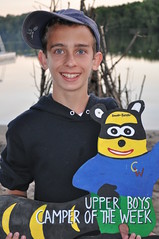 A mentor of mine recently told a story of doctor who works with people with difficult injuries and afflictions. Rather than ask his patients “How are you feeling today?”, the doctor always asked “What are your plans for the day?” Do you see the difference?
A mentor of mine recently told a story of doctor who works with people with difficult injuries and afflictions. Rather than ask his patients “How are you feeling today?”, the doctor always asked “What are your plans for the day?” Do you see the difference?
The first question makes you react to your situation, whatever that may be. The patient would focus on their ailment or pain. The second question prompts the patient to think about the choices that lay ahead of them. It also reminds them that they are in control of those choices.
Seth Godin, one of my favorite thinkers and this year’s keynote speaker at the ACA Tri-State Conference, recently wrote about choices a person chooses to make. Choices, and their consequences, are even a mantra in the recent thriller The Girl with the Dragon Tattoo.
Choices abound in our incredible society. We are fortunate to have protected choices of religion, action, and thoughts. It’s vitally important that we think about these choices and there consequences and teach young people the power they have over their own choices.
So, what are your plans for the day?
Cole Kelly, Camp Director

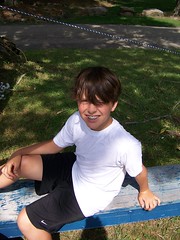 Nicolas had mostly attended an international school and studied English in Switzerland, so his communication skills were well developed and he felt comfortable with the prospect of adjusting to a new culture. He had also previously visited the United States and after switching to Swiss school last year, his mother wanted him to retain his fluency in English, learn about American culture first hand, and make American friends. Christine says there are a number of American camps that promote their programs in Switzerland but she avoided their outreach since she “did not want to send Nicolas to the United States just to meet other French guys!!!”
Nicolas had mostly attended an international school and studied English in Switzerland, so his communication skills were well developed and he felt comfortable with the prospect of adjusting to a new culture. He had also previously visited the United States and after switching to Swiss school last year, his mother wanted him to retain his fluency in English, learn about American culture first hand, and make American friends. Christine says there are a number of American camps that promote their programs in Switzerland but she avoided their outreach since she “did not want to send Nicolas to the United States just to meet other French guys!!!” Christine’s nieces both had a wonderful camp experience in the United States, but Christine felt that Nicolas would be more open to forging friendships and getting to know American kids, if he ventured on his own—and every mother understands that each child is different! Nicolas completely agreed about coming to camp on his own and since he was a little familiar with American culture and speaks English, that’s what worked for him.
Christine’s nieces both had a wonderful camp experience in the United States, but Christine felt that Nicolas would be more open to forging friendships and getting to know American kids, if he ventured on his own—and every mother understands that each child is different! Nicolas completely agreed about coming to camp on his own and since he was a little familiar with American culture and speaks English, that’s what worked for him.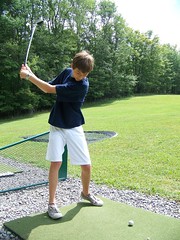

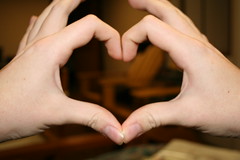 In an earlier
In an earlier  Of course, selecting the right people is only the beginning of the process of creating a successful staff. The counselors must also be trained and oriented to the camp’s particular processes, schedules and procedures. To do so, all staff must complete a week-long Orientation. We are especially lucky to have large groups of former campers who return to be counselors. They know the camp traditions and songs, and, more importantly, they remember what camp looks like from the point of view of the campers. At Orientation, they can share their experiences with new staff members and serve as ambassadors for our particular mission and traditions.
Of course, selecting the right people is only the beginning of the process of creating a successful staff. The counselors must also be trained and oriented to the camp’s particular processes, schedules and procedures. To do so, all staff must complete a week-long Orientation. We are especially lucky to have large groups of former campers who return to be counselors. They know the camp traditions and songs, and, more importantly, they remember what camp looks like from the point of view of the campers. At Orientation, they can share their experiences with new staff members and serve as ambassadors for our particular mission and traditions.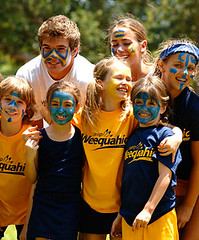 Beyond the formal week long Orientation, over half of the individual activity instructors (waterfront, rock climbing, mountain biking, etc.) come to camp early, with key staff and counselors often training three weeks prior to Orientation. Counselors who are responsible for specific program areas are also trained to write lesson plans and taught how to execute a fun and instructional activity period. Each attends an entire training day devoted to teaching kids their particular activities and making it fun. Finally, every camp staff member is well-trained in general safety procedures and first aid, with additional courses and certifications dependent on counselor responsibilities.
Beyond the formal week long Orientation, over half of the individual activity instructors (waterfront, rock climbing, mountain biking, etc.) come to camp early, with key staff and counselors often training three weeks prior to Orientation. Counselors who are responsible for specific program areas are also trained to write lesson plans and taught how to execute a fun and instructional activity period. Each attends an entire training day devoted to teaching kids their particular activities and making it fun. Finally, every camp staff member is well-trained in general safety procedures and first aid, with additional courses and certifications dependent on counselor responsibilities.